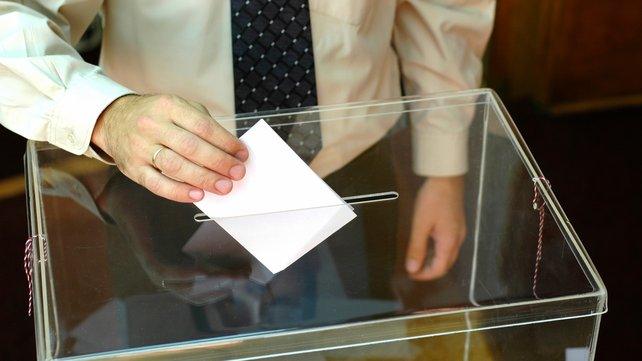Same-sex marriage: Call for Irish emigrants to vote in referendum
- Published
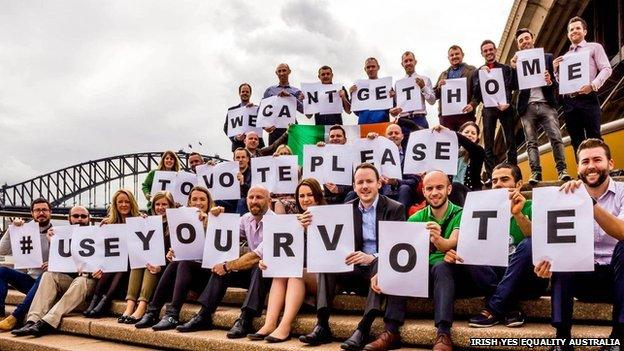
Irish emigrants abroad have used social media to encourage people in their homeland to vote on 22 May
Irish people who have recently moved abroad have been encouraged to travel home to cast their vote in Friday's referendum on same-sex marriage.
The referendum is due to take place on 22 May and voters are being asked if same-sex couples should be given the right to marry in a civil ceremony.
Irish citizens living abroad are eligible to vote provided that they are still on the Irish electoral register, external.
But if they left Ireland more than 18 months ago they are no longer eligible.
Many Irish emigrants who are no longer entitled to vote have used social media campaigns to urge those who can to make their mark.
'History in the making'
Some expats who can vote are planning expensive journeys home, such is their strength of feeling on the issue.
They include Mark Govern, who is originally from Tallaght in Dublin but moved to Australia last summer.
He has spent almost 1,200 euros (£867) booking flights home from Sydney and plans to arrive in Dublin on the eve of the referendum.
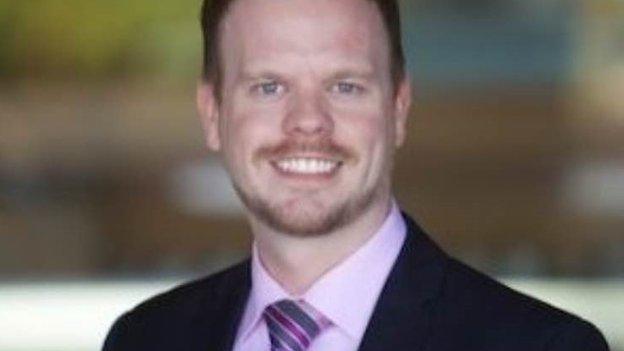
Dubliner Mark Govern has spent hundreds of euros to fly home from Australia to vote in the Irish marriage referendum
Having already booked his summer holiday home in August, Mr Govern said next week's trip was specifically arranged so he could be in Ireland to witness "history in the making".
'Liberal country'
The 31-year-old Dubliner told the BBC that as a gay man he was "very passionate" about same-sex marriage rights and that securing a yes vote was extremely important to him personally and to his native country, politically.
"People think the Republic of Ireland is a Catholic, conservative, very traditional country - but that's not the country I grew up in. I grew up in a liberal country," Mr Govern said.
He said he believed that a 'no' vote would reinforce a mistaken "stereotype" of Irish conservatism abroad and could discourage young Irish emigrants from returning home in the future.
Mr Govern said he was confident the referendum would pass and wanted to be in his home city for the result on Saturday 23 May.
He objected to the 'no' campaign repeatedly raising concerns over adoption and surrogacy by same-sex parents in the debate, describing them as "red herrings".
However, central to those who have publicly opposed same-sex marriage is the belief that a child has a birthright to both a mother and a father. Many of them have expressed concerns about the potential consequences for the future development of Irish family law.
'Biological link'
The campaign group Mother and Fathers Matter has claimed that if the referendum is passed, it will be "constitutionally impossible for the law to show any preference for a child having a mother and father in relation to adoption, surrogacy and Donor Assisted Human Reproduction (DAHR)".
Yes campaigners argue that same-sex adoption and DAHR are already being dealt with separately through the wide-ranging Children and Family Relationships Bill, which, among other changes, will allow same-sex couples to jointly adopt children.
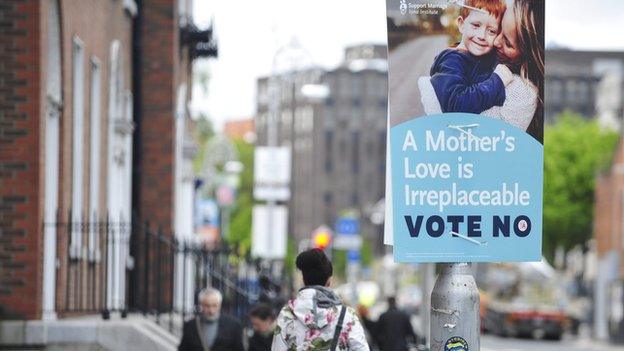
The 'no' campaign has raised concerns about the implications for Irish family law and the rights of biological parents
But US-born Kathy Sinnott, from the campaign group First Families First, said she believes a 'yes' vote would not only "redefine marriage" in the Irish constitution, but also the meaning of family, severely downplaying the importance of a child's "biological link" with his or her parents.
The former Irish MEP said that after the raft of recent legislative changes, Friday's marriage referendum could remove the "final brick" that provides constitutional protection for relationship between children and their genetic parents.
Ms Sinnott said that it could have "huge ramifications" for biological parents - gay or straight - who have the misfortune to find themselves fighting custody battles in the family courts in the future.
But for yes campaigner and Irish expat Joey Kavanagh, the referendum is really about equality of treatment for all Irish citizens.
Originally from Ashbourne in County Meath, he has been living in London for the last 10 months.
'Make a statement'
When the Irish government confirmed the date of the referendum, Mr Kavanagh set up an online campaign - Get The Boat 2 Vote - to encourage emigrants to go home to vote yes.
Almost 300 people have signed up to his campaign's mailing list, and several hundred more have engaged with the campaign on social media.

London resident Joey Kavanagh has set up an online campaign - Get The Boat 2 Vote - to encourage Irish emigrants to go home to vote yes
On the day of the referendum, Mr Kavanagh plans to lead a group of about 30 Irish expats who will travel together on a ferry to Dublin to "make a statement".
He said the numbers were small but other supporters were making the journey across the Irish Sea in the days before the vote, as many still face long journeys to polling stations after arriving in Dublin.
Mr Kavanagh said he had no immediate plans to return to Ireland and marry, but hopes to "settle" in his native country in the future and as a gay man, he wants the option that is available to other Irish citizens.
He said in general, the Irish diaspora should be granted more of a say over important decisions taken in their homeland and more provisions should be made for postal and embassy votes.
'Not homophobic'
The public debate on same-sex marriage has raised tensions both at home and away.
In a recent opinion piece for the Irish Independent newspaper, external, high-profile Gaelic Athletic Association player Ger Brennan wrote that he was "sick of the accusations being flung around that if you vote 'no' you are homophobic".
"I know I'm not homophobic; my gay friends and family can attest to that. I am voting 'no' because I don't want our constitution to deny that it is a good thing for a child to have a mother and a father".
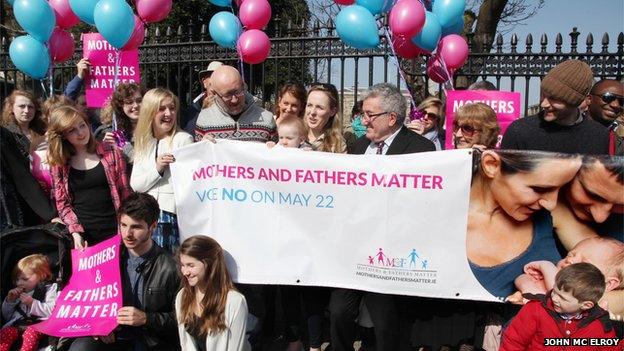
The lobby group Mothers and Fathers Matter is campaigning for a 'no' vote
According to the independent Referendum Commission, if passed, the referendum would mean a same-sex marriage would have the same status under the Irish constitution as a marriage between a man and a woman.
All married couples, heterosexual and homosexual, would be recognised as a family and entitled to the constitutional protection for families.
A separate vote, on a proposal to reduce the age at which candidates can run in the Irish presidential election from 35 to 21, is set to take place on the same day.
- Published1 May 2015
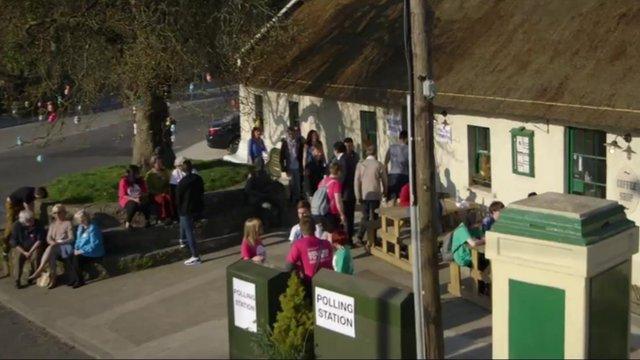
- Published1 May 2015
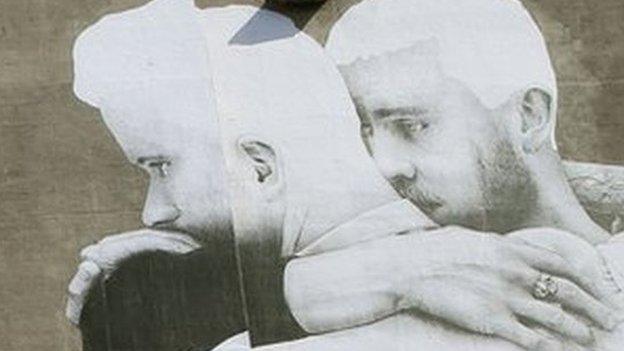
- Published30 September 2013
